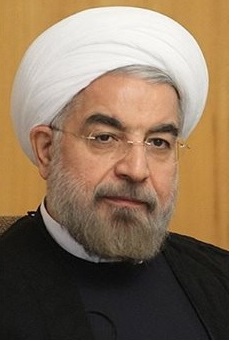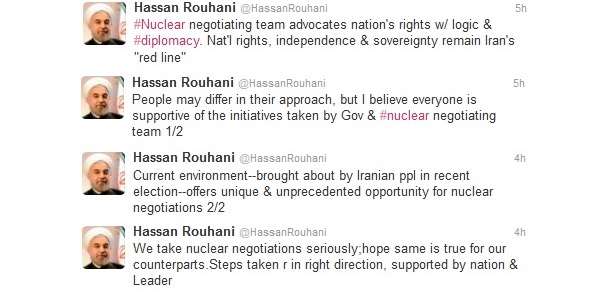 World leaders expressed skepticism that the second round of diplomatic talks in Geneva would produce a dramatic breakthrough agreement on Iran’s controversial nuclear program. Even President Hassan Rouhani (left), who reinvigorated diplomacy after his August inauguration, was skeptical. “The government is not optimistic about the Westerners and the current negotiations. But it does not mean that we should not have hope for removing the problems,” he reportedly said on November 4.
World leaders expressed skepticism that the second round of diplomatic talks in Geneva would produce a dramatic breakthrough agreement on Iran’s controversial nuclear program. Even President Hassan Rouhani (left), who reinvigorated diplomacy after his August inauguration, was skeptical. “The government is not optimistic about the Westerners and the current negotiations. But it does not mean that we should not have hope for removing the problems,” he reportedly said on November 4.
Supreme Leader Ayatollah Ali Khamenei shared the president’s outlook. “I am not optimistic about the negotiations but, with the grace of God, we will not suffer losses either,” Khamenei said on November 3.
Western leaders were as cautious as their Iranian counterparts. Secretary of State John Kerry expressed a will to test diplomacy while seeming to allude to possible military action if all else fails. “I want to emphasize, President Obama will not take any option off the table in this process, but we do seek to put to test the reality of the possibility of a diplomatic solution,” Kerry said on November 4. E.U deputy foreign policy chief Pierre Vimont noted on October 29 that Iran’s “proactive diplomacy” has yet to “pave the way to major concessions.”
The following are excerpted remarks by top Iranian, U.S. and E.U. officials on the status of nuclear talks.
Iran
Supreme Leader Ayatollah Ali Khamenei
“I am not optimistic about the negotiations but, with the grace of God, we will not suffer losses either… All the better if the negotiations bear fruit but if there are no results, the country should rely on itself.
“The Americans smile and express desire for negotiation; on the other hand, they immediately say that all options are on the table… We should not trust a smiling enemy.
“No one should see our negotiating team as compromisers. They are our own children and children of the revolution. They have a difficult mission, and no one has the right to weaken an official who is doing his job.
“The Americans have the highest indulgence towards the Zionists and they have to. But we do not share such indulgence. The Zionist regime is an illegitimate and bastard regime.”
“To solve the country’s problems, [we should] look inward. In diplomacy, a successful country relies on domestic capacity.”
Nov. 3, 2013 in remarks to students
President Hassan Rouhani
“The government is not optimistic about the Westerners and the current negotiations. But it does not mean that we should not have hope for removing the problems.”
Nov. 4, 2013 in remarks published by the Islamic Republic News Agency (IRNA)
In a November 3 cabinet meeting, President Rouhani was ore optimistic about upcoming talks. His office tweeted translations of his remarks.

“Had it been otherwise, the [nuclear] case would have been settled much sooner and without the ongoing visit and talks… Naturally, reaching agreement and settling all the problems would take time; of course, I hope we will take the initial step to solve the problem by the year-end.
“Stronger support inside, will empower the government to proceed with the campaign against sanctions.”
Oct. 28, 2013 in a meeting with lawmakers
Foreign Minister Mohammad Javad Zarif
“On the nuclear issue, I believe the problem we have faced in the last ten years is we have both seen the nuclear issue as a zero sum game; we have articulated two seemingly opposing objectives, and each tried to make gains for one objective seemingly at the expense of the others.
Tehran will “do everything in our negotiations with the P5+1 [world’s six major powers] to ensure that even the perception that Iran has anything but peaceful intentions for its nuclear program will be removed, because we believe that even the perception that Iran pursues a nuclear weapons program is not only wrong, but dangerous.
“The result has been that ten years ago, Iran had less than 160 centrifuges spinning, now it has over 18,000. Iran’s economy was prospering, now sanctions are hurting the wrong segment of the population. I hope we have come to understand that approach was wrong.
You “cannot kill all our scientists and kill our program. …You cannot destroy the technology. How to ensure [the program] is peaceful: allow it operate in a transparent fashion; you cannot push it under the rug.”
“I believe leaders need to show leadership [on the nuclear dispute]. I think experience shows, once there is a good deal, the U.S. president will be able to sell it, and I think we will be able to sell it too.”
Nov. 1, 2013 in a speech at the Pugwash Conference in Istanbul, Turkey
The United States
Under Secretary for Political Affairs Wendy Sherman
“We do not approach this [dispute] on the basis of trust because we know there's great deal of mistrust on both sides.”
“We have not offered any sanctions relief on Iran, and we have not removed any sanctions.”
“If we can, in fact, stop the program from advancing further while we negotiate a comprehensive agreement and offer very limited, temporary, reversible sanctions relief but keep in place the fundamental architecture of the oil and banking sanctions — which we will need for a comprehensive agreement, not for a first step — then I think we are starting to make progress… No deal is better than a bad deal.”
Nov. 1, 2013 in an interview with Israel Channel 10
Secretary of State John Kerry
“Finally, on Iran, let me reiterate the position that President Obama has made clear many times: The United States will not allow Iran to acquire a nuclear weapon. That policy has not changed. President Obama has stated again and again that our preference is to resolve this challenge peacefully, through diplomacy, and we are committed to giving diplomacy a real chance to succeed. And while this window is open, while we are testing whether Iran is willing to take the steps required to satisfy the international community’s concerns, the burden remains squarely on Iran to demonstrate through credible and verifiable action that its nuclear program is indeed, in fact, peaceful and only peaceful.
“We state clearly: Words will not satisfy this. It’s only actions that will speak to our concerns. We believe that no deal is better than a bad deal. That won’t change. And I want to emphasize, President Obama will not take any option off the table in this process, but we do seek to put to test the reality of the possibility of a diplomatic solution.”
Nov. 3, 2013 in remarks with Saudi Arabian Foreign Minister Saud al Faisal
President Barack Obama
“I shared with the [Iraqi] Prime Minister [Nouri al Maliki] our efforts to resolve the Iranian nuclear issue in a peaceful way, but emphasized to him how important it is that Iran seize this opportunity to take the right path in accordance with previous international norms and resolutions. My hope is, is that we can arrive at a resolution, but I emphasized to the Prime Minister how serious we are about preventing a nuclear arms race in a region that would only add to the dangers that so many people there already face.”
Nov. 1, 2013 after a meeting with Iraqi Prime Minister Maliki at the White House
The European Union
Pierre Vimont, Secretary-General of the European External Action Service
“The new Iranian negotiators have undoubtedly adopted a new approach, but it is still rather difficult to conclude that they have presented a new policy. The Iranian team has definitely decided to go for a very proactive diplomacy, but whether this will pave the way to major concessions on the substance of these talks remains to be seen. So far, the Iranian side has made a rather comprehensive presentation combining what could be seen as the endgame of the present talks and, at the same time, what can be depicted as the first mutual moves that both sides could agree on in an effort to engage in some confidence-building measures.”
Oct. 29, 2013 in an interview with Al Monitor
